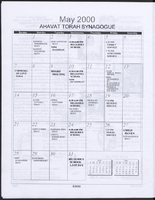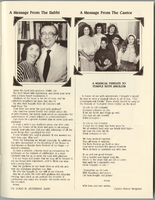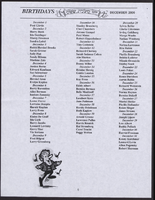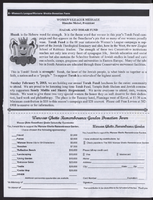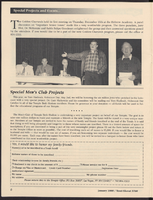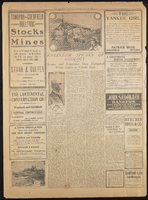Search the Special Collections and Archives Portal
Search Results

Transcript of interview with Ike Lawrence Epstein by Barbara Tabach, August 24, 2017 and February 2, 2018
Date
Archival Collection
Description
Ike Lawrence Epstein’s office at the recently opened UFC headquarters is sunlit and handsomely decorated. A black and white photo taken by the famous British photographer David Bailey of the Kray brother adorns the wall. Lawrence, as everyone knows him, is the son of Kenny Epstein and Donna Goldstein. He was born, in 1966, and raised in Las Vegas. He attended Vanderbilt University (BA 1989, JD 1992) and then returned to live full time in Las Vegas with his law degree in hand. In addition to being COO of the UFC, he is active in the family business, the El Cortez Hotel and Casino. In this oral history, Lawrence recalls his grandparents, their careers in Las Vegas, and his youthful favorite holidays being Passover and Thanksgiving. He became a bar mitzvah in Israel, a tradition he continues with his own children with Michelle Epstein. Lawrence serves the community as a board member of Meadows School and on the Stadium Board. As an executive with UFC [Ultimate Fighting Championship], Lawrence observes the overall magnitude of sports in Las Vegas in 2017, how it came to this point with professional sports, and what he envisions as the future possibilities of the city as an international sports destination.
Text

Transcript of interview with Norma Morrow Zuckerman by Barbara Tabach, April 18, 2016 & March 13, 2017
Date
Archival Collection
Description
Norma Morrow Zuckerman is the driving force behind the Jewish Repertory Theatre of Nevada [JRTN], an organization she co-founded with Charlene Sher in 2010. The endeavor coincided with Norma’s pursuit of an MFA at UNLV a couple of years prior. With the commitment to her studies and to bring professional Jewish theatrical performances to Las Vegas, her energetic personality intensified. In 2007, she performed in The Diary of Anne Frank and noted the audience was supporting Jewish Family Services Agency. Norma could sense the community’s eagerness for professional theatre and she was just the one to deliver it. Over the following years, JRTN produced an array of Jewish-themed and acted plays. Since then she tries to bring The Diary of Anne Frank to the stage annually and finds partners to bring 1400 eighth graders to the performance. By 2012, her commute between Los Angeles, where she is a garment designer/manufacturer with her husband Eugene, and Las Vegas had become routine and her passion for professional theatre in Las Vegas increased. This was the year that The Smith Center for Performing Arts opened. The first theatrical production was Golda’s Balcony, a one-woman drama starring Tovah Feldshuh. It was the spectacular co-promotion by Norma’s JRTN and the Smith Center. Norma was smitten with the theatre from a young age and studied with some of the best acting coaches—Milton Kastelas, Stella Adler, Wynn Handman. In this oral history she recalls the people who have helped her, the performances that have charmed audiences and the value of live theatre.
Text

William McLeod interview, March 16, 1978: transcript
Date
Archival Collection
Description
On March 16, 1978, Valerie McLeod interviewed her father William Lee McLeod (b. January 31st, 1937 in Los Angeles, California) about his life in Las Vegas, Nevada. McLeod begins by speaking about his career as a contractor, the growth of Las Vegas and the city’s population. Moreover, he speaks about recreational activities such as riding motorcycles and exploring mines around Nevada. McLeod also spends time going over Indian reservations around Nevada and neighboring states, the Lost City in Nevada, boomtowns and ghost towns. Lastly, McLeod talks about the history of water and springs in the state of Nevada, what he would consider to be the Old Ranch and the stagecoaches that passed through Gold Point, Nevada.
Text

